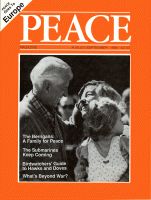
Peace Magazine Aug-Sep 1986, page 11. Some rights reserved.
Search for other articles by Alan Wilson here
VANCOUVER'S OLD MOVIE HOUSE, THE ORPHEUM theatre was packing them in like the old days between April 24-26. During that city's Peace Festival a symposium was held that brought together 23 speakers from seven countries. The arms race was linked with unemployment, poverty, and hunger repeatedly during the three days. It is the Third World that pays the immediate costs of the arms race as thousands die daily from the effects of underdevelopment. Canada was called an "accomplice" in this injustice. It was noted, for instance, that Canada failed to support the UN Secretary General's 1984 report which advocated unilateral or independent nuclear disarmament steps. That report was adopted by 126 countries to 1, with Canada abstaining.
Canada's UN Ambassador, Stephen Lewis, who chaired the final session of the Symposium, evaded questions about the Canadian stance at the UN, and carefully neglected to explain his remarkaby reliable endorsements of U.S. policies and actions, such as the recent Libyan strike.
OTHER SPEAKERS WERE NOT SO RETICENT, HOWEVER. Most went out of their way to condemn the dangerous U.S. actions in Libya. And many spoke of the need to get "to the roots of terrorism," referring to the injustices that inevitably give rise to violence. "State terror," they said, "is no way to reply to violence inspired by desperation." And Michael Pentz, Dean of Sciences of Britain's Open University, cited the Libyan adventure as an example of what may well bring about World War III: "Madness in high places."
Pentz confidently asserted that in the next British general election Labour would win. A Labour government, he said, would see to it that U.S. cruise missiles were removed from the British Isles. Similarly, both Petra Kelly and her parliamentary colleague, General Gert Bastion, were confident that the cruise and Pershing missiles would ultimately be rejected by West Germany. In contrast to the optimism of the Europeans, however, was the U.S. speakers' lack of hope about the American political horizon.
U.S. economist John Kenneth Galbraith said he doubted that effective political change was any longer possible in his country, charging that military power was now a force out of control. He said, "No informed citizen can any longer believe there is any possibility of controlling that power by democratic means." He described the role of U.S. politicians as "articulate advocates" for the military power, saying that arms control negotiations are employed purely as a smokescreen "to control public opinion." He stressed that the major concern of the peace movement must be with the military/industrial concentration that promotes the arms race.
BUT FORMER U.S. ARMS NEGOTIATOR PAUL WARNKE disagreed, arguing instead that politicians can direct where the money will be spent. He noted that the bank robber Willy Sutton once said he robbed banks "because that's where the money is," and added that if the money moves, the corporations will follow it. He also took exception to the prevailing view, as expressed by Michael Pentz, that the U.S. had forced the cruise and Pershing missiles on Europe. Warnke said that the Europeans had in fact requested them. "All you've got to do is tell us to take 'em back" he said, "and we'll take 'em back." Surprisingly, he also asserted that "there is doubt in the U.S. whether our allies want us to stop testing or stop the development of nuclear weapons." And he advised U.S. allies, particularly Canada, "to make it clear to the U.S. that the nuclear umbrella isn't very useful."
Warnke and Pentz did wholeheartedly agree that nuclear weapons are not weapons at all. Pentz said it is abundantly clear that only two percent of the current arsenals are "useful" since they alone are enough to destroy the world. One could argue that this two percent is justified as necessary for deterrence. But Pentz pointed out that if "98 percent are totally useless, and the other 2 percent are 'useful' only if we never use them," then how can they be called weapons at all?
WE MUST HOPE THAT VITALY ZHURKIN (DEPUTY DIRECtor of the U.S. and Canada Institute in the USSR) is accurate in his statement that "there is a very clear understanding in the Soviet Union that you cannot achieve security by military or technical means." He also said that "the problem of security can only be settled by common security."
THE VANCOUVER PROPOSALS WERE READ, PROPOSING
1. a Comprehensive Nuclear Test Ban Treaty;
2. a ban on all space weapons;
3. a freeze on development, testing, and deployment of new nuclear weapons;
4. immediate substantial reductions in nuclear arsenals;
5. the establishment of nuclear weapons free zones in sensitive areas of the globe;
6. the renunciation by all states of the use of force and intervention in the affairs of other states;
7. the substantial reduction of all military budgets and the transfer of resources to human needs.
The Proposals stated firmly that "these are steps that can and must be taken now. None of them need wait for long negotiations and formal treaties. The process must be started and independent initiatives are therefore needed. Let us act together now to end the arms race and fund human needs."

Peace Magazine Aug-Sep 1986, page 11. Some rights reserved.
Search for other articles by Alan Wilson here